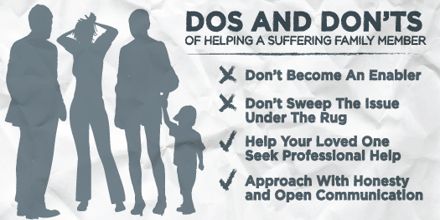Helping an Addict
Trying to help someone with an addiction can be a long, challenging, and painful process. Unlike someone with a physical health condition, such as cancer, a person with an addiction might not recognize the true danger of their illness or understand the risks of not treating it.
If someone you know has an addiction, they’re ultimately responsible for their recovery. To help them recover, talk to them about your concerns and offer your support.
It’s important to remember that they are ultimately responsible for their own recovery. Typically, they must first recognize that they have an addictive disorder. Then, they must be ready and willing to address their addiction before their recovery can even begin. Setting realistic expectations and boundaries can help you provide support, while protecting your own well-being.

What You Can Do
- Get educated.
You can’t help fight an enemy you don’t understand. Learn about addiction — the signs, the treatments, the relapse triggers — and talk to your loved ones about drugs and alcohol from an early age. Of course, education is no guarantee of healthy choices, but it can be a powerful tool in preventing drug abuse and finding a way into recovery.
- Take care of yourself
A critical lesson for Eve was the importance of being good to herself, regardless of whether her son was doing well. You can’t control another person, but you can make healthy decisions for yourself. And you must in order to have any hope of being able to support and encourage your loved one.
For some people, groups like Al-Anon provide a safe place to get education and fellowship with others who are facing similar struggles. Others prefer seeing a therapist privately or joining a different type of support group.
- Talk about it
Talking about the problem can be healing both for the person trying to overcome addiction as well as their loved ones. A person with a drug problem may be reluctant to come to you and ask for help, but if you can tolerate the lies and manipulation, an open dialogue is your best chance to be there for them when they need you most.
“Work on building a good relationship, without judging or accusing,” Eve suggests. “You have to step back, you can’t be on top of them all the time, or they won’t trust that they can come to you.”
What You Can’t Do
- Make them quit
You can stage an intervention, and you may be successful, but you cannot force someone with a substance abuse problem to quit. Even in states that allow involuntary treatment, you can’t make someone get sober.
- Do the work of recovery for them
Even if a loved one goes to drug rehab, you can’t do the work of recovery for them and you can’t prevent relapse. After Eve’s son completed addiction treatment, everything was going well. He had a job and was rebuilding his life. He told his mom “I’m never going back to that bad place again.”
Months later, he spiraled back into active addiction. She tried to talk with him about the signs she was seeing, but he didn’t want to admit it. One night, Eve heard unusual breathing from his bedroom and when she checked on him, she couldn’t wake him up. After six weeks in a coma, the doctors told Eve that Isaac was gone.
- Accept behavior that violates your boundaries
To avoid enabling, loved ones have to set boundaries. And once you’ve laid out your boundaries, allowing them to be violated destroys your credibility and perpetuates your loved one’s addiction.
“If you don’t follow through with consequences when someone violates one of your boundaries, your word is like quicksand,” says Bennett. “If you say what you mean and mean what you say, even if they’re mad at first, they’ll respect you in the long term.”

Talk to someone with an addiction
Start by trying to talk to the person about their addiction. Having a one-on-one conversation may be less intimidating than staging an intervention with several people.
Find a time when you can be alone together and free of distractions or interruptions. Tell them that you’re concerned about their behavior and ask if they’re open to hearing your thoughts. Try to use non-blaming language and avoid raising your voice or getting angry. They will likely respond better if you communicate from a place of compassionate concern. It may also help to talk about specific behaviors or incidents related to their addiction that have directly affected you.
If they’re receptive to hearing your thoughts and concerns, ask if they would be willing to seek professional help. They may not be open to discussing this option. They may become defensive. If this happens, let it go for the time being. Don’t threaten or shame them. Instead, start talking with other family members and concerned parties to begin planning an intervention.
If necessary, stage an intervention
If the person is in grave danger or doesn’t respond to your concerns, it may be helpful to stage an intervention. Before organizing an intervention, it may help to talk to a substance abuse counselor, social worker, or other trusted health expert. Their guidance may be very helpful, especially if they’re willing to attend the intervention itself.
Organize a time when friends, family, and other concerned parties can gather together. Allow at least a few hours for the intervention. Everyone present should have enough time to communicate his or her thoughts and feelings.
















